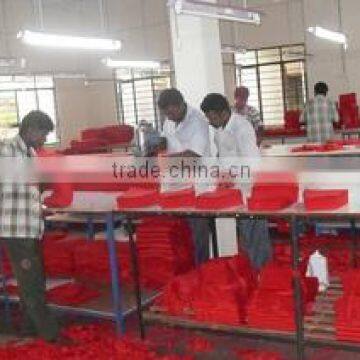Company Overview
We at Gaga Exports Tirupur India. We are the leading Knitted T SHIRTS MANUFACTURES AND EXPORTERS in Bamboo T SHIRTS, ORGANIC COTTON T-SHIRTS
The positive results of wearing Bamboo clothing go well beyond the consumers enjoyment of soft, breathable, moisture wicking, organic fabric, but also include benefits that can affect the entire global community. Purchasing and wearing Bamboo promotes and supports the growth of our bamboo plantations which are harvested on a rotational basis. That means that while other crops like cotton must be entirely decimated at the time of harvest thereby causing bare soils to bake and release more carbon into our atmosphere, Bamboo plantations are harvested in portions at a time. There will always be some part of the plantation still standing and doing well for the environment. And since bamboo grows like grass, sending up new shoots continually and in a sustainable manner, harvesting bamboo is similar to mowing your lawn. Replanting is not necessary as it is with other crops, thereby reducing the carbon footprint even further. And contrary to the claim that land is clear cut to make way for bamboo, our bamboo plantations have been in existence for decades. People need to understand India, CHINA, Asia in general have been utilizing bamboo for generations, for everything from building material to furniture to food.
Meanwhile, as the Bamboo plantations are growing, the bamboo itself is working to make our environment a better place. Among other benefits, bamboo takes in 5 times as much green house gas, and produces 35 per cent more oxygen than an equivalent stand of trees. What an amazing natural source to replenish our fresh air and fight global warming
Our Bamboo plantations are also pesticide and fertilizer free, as bamboo flourishes on its own, and naturally resists pests. This is a break through fabric when you consider that conventional cotton uses more insecticides than any other single crop and epitomizes the worst effects of chemically dependent agriculture. The typical spraying application results in volatile organic compounds released into the air and contributing to green house gases. Additionally, such spraying harms the health of the soil and pollutes the ground water, lakes and streams. Five of the top nine pesticides used on cotton in the U. S. cyanide, dicofol, naled, propagate, and trifluralin are KNOWN cancer causing chemicals. All nine are classified by the U. S. EPA as Category I and II the most dangerous chemicals. Here something to think about it takes nearly a pound of such chemicals to grow the cotton for one pair of pants and a shirt. Bamboo provides a superior and eco friendly alternative to such pesticide intensive crops, and to petrochemical based fibers like nylon and polyester.
While the creation of Bamboo fiber seems to have mystified a few and even spurred some erroneous reports on how bamboo fiber is manufactured, the process is really quite simple. The bamboo culms can be pulped through a process of mechanical combing, and or baths of sodium hydroxide. These processes are completely closed, which means that the release of byproducts into the environment is negligible. The chemicals involved are good chemicals compared to the truly dangerous ones used to produce cotton and polyester. Sodium hydroxide is reactive but it is not toxic, i. e. it does not cause DNA damage, does not enter the food chain and is short lived because of its reactivity. It is easily neutralized into salt and water. Furthermore sodium hydroxide is used as a washing agent for almost all organic cotton textiles and is certified by the global organic textile standards.















 Durairaj Ganapathi
Durairaj Ganapathi
